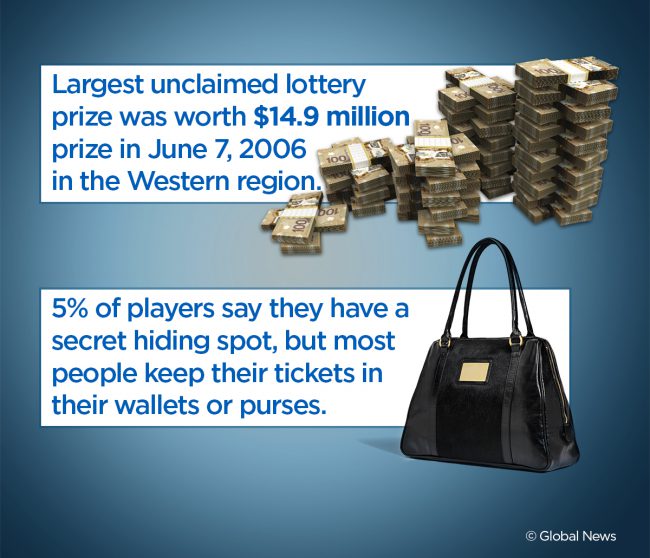Editor’s Note: The total amount of unclaimed money was updated to $46 million based on new information from the Atlantic Lottery Corporation.

Do you have any extra lottery tickets hanging around? They just might be worth millions.
In Quebec, officials are trying to find a winning ticket worth over $1 million dollars — and several others worth over $100,000.
In Atlantic Canada, officials are searching for two tickets worth $500,000 each.
And there’s currently over $8 million unclaimed in Ontario, and over $2 million in Alberta.
But there’s a catch: you only have a year to cash in.
Lottery tickets expire 52 weeks after the numbers are drawn. (Scratch-and-win tickets usually will have an expiry date printed on the card.)
Around $46 million of lottery prizes went unclaimed in Canada in the 2017 fiscal year.
That’s around one per cent of total prize money that was given out by lotteries, including major national lotteries like Lotto 6/49 and Lotto Max as well as smaller ones like provincial lotteries and scratch tickets.
Most of the money goes unclaimed in Ontario, with $21.8 million unclaimed in 2017-18 according to Ontario Lottery and Gaming (OLG).
In British Columbia, there was $7.4 million unclaimed, and in Quebec, there was about $7 million.
The Western Canadian Lottery Corporation — which includes the prairie provinces and the territories — and the Atlantic Lottery Corporation didn’t provide data, but Global News calculated their values as $6.7 million and $4 million respectively, based on one per cent of their prize money given out in the 2017-18 fiscal year. (WLCL gave out $671 million in prize money and ALC gave out $392 million according to their public annual reports.)
“Most unclaimed prizes are for small amounts such as a few dollars,” Dita Kuhtey of the OLG explained.

Get weekly money news
“It’s rare for major prizes to not be claimed.”
Despite that, the largest unclaimed prize in Canada is a $14.9 million prize from Lotto 6/49 in 2006.
Another $5 million went unclaimed in Ontario in 2004, and two $1 million prizes went unclaimed in B.C.
She says the OLG makes an effort to find those who haven’t cashed their tickets of over $10,000 or more by reaching out to media in the area the ticket was bought.

Renaud Dugas of Lotto-Quebec said 95 per cent of people will claim their prizes within two to three weeks.
And according to a recent survey done by the OLG, 38 per cent of players will check their ticket immediately after the draw, while another 45 per cent will check when they remember. That leaves only 17 per cent of players who don’t check regularly.
“The vast majority of major prizes are claimed because players are always eager to check their tickets after a draw,” Greg Weston of the ALC explains.
As for those who don’t check? There’s a variety of reasons.
Kuhtey says it could be seasonal — for example, forgetting a ticket in a winter coat or finding a ticket during spring cleaning.

In Quebec, a father and son found a winning ticket amongst all the tickets left in their car after hearing about an unclaimed prize.
“Maybe they just forgot to check, maybe during the holidays they put it [away] and they just forget about it,” Dugas explained. “It’s very important for them to check their tickets.”
Lottery corporations across the country encourage people to sign the backs of their tickets and check as soon as they can.
You can check if your tickets are a winner at any lottery distributor across the country, and you can check the winning numbers for Ontario, Western Canada, and Quebec online.
What happens to unclaimed lottery money?
The money for national lotteries goes back into a pot for special prizes or draws, such as the Maxmillion prizes in the Lotto Max or the guaranteed million dollar prizes for Lotto 6/49.
Unclaimed LOTTO MAX and LOTTO 6/49 prizes accumulate, on average, at a rate of about a million dollars each month, WLCL officials explained.
With provincial lotteries in B.C., Ontario and the Western region, such as BC/49 and ENCORE, the money is returned as revenue to the province.
For smaller prizes in Quebec and Atlantic Canada, the money is redistributed into a special prize fund like the national ones are.








Comments
Want to discuss? Please read our Commenting Policy first.